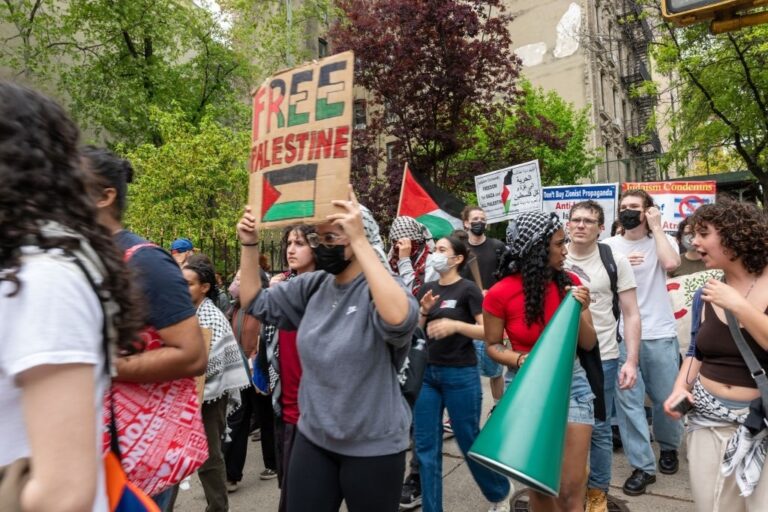College Protesters: Who are they?
American youth, professional agitators, international students, or all of the above.
By: GenZ Staff | May 8, 2024 | 844 Words

(Photo by Spencer Platt/Getty Images)
It’s a bird; it’s a plane – no, it’s super-protester! On college campuses from coast to coast, civil unrest is taking place at an alarming rate. But don’t ask the rabble to identify themselves; these protesters are loud, but they don’t appear to be proud. There is an obvious reason for protesting in disguise: fear of reprisal.
Increasingly pro-Palestinian agitators are donning keffiyehs and surgical masks before heading out the door with their pre-printed placards looking to all the world like a mob of mini-Yasser Arafats. The only problem is that those protesting have probably never even heard of the famed Palestine Liberation Organization (PLO) chairman. However, their lack of knowledge doesn’t prevent them from getting on a soap box and scaring the bejesus out of Jewish students, or worse.

(Photo by Adam J. Dewey/Anadolu via Getty Images)
Today’s protesters want to be heard but not identified, so they cover their faces, thinking it will protect them from being held accountable. This need to conceal suggests a desire to “protect their anonymity even as they demand universities and governments be held to account,” according to The New York Times.
To ascertain who is up to no good on campus, one might want to reflect on the makeup of the student body. Today’s college campuses look nothing like those of days gone by. They are jam-packed with international students, leaving many Americans questioning whether some foreign students came here to get an education or if their intent is more sinister – perhaps for such a time as this.
According to Statista, there are more than 15 thousand students across the nation from Saudi Arabia, another ten thousand from Iran, over eight thousand from Turkey, and you don’t want to know the number from China – but that’s a whole other kettle of fish. “In 2022/23, there were 467,027 international graduate students, which accounted for over one-third of the international students in the country,” according to Statista. That means there are approximately 1.5 million students who hail from other countries. Oh yes, 21st-century college campuses are very diverse places indeed. There are no statistics, however, to tell us how many came here for an education and how many came to agitate. College protesters want to engage in free speech – but they don’t want their visas revoked.
Fear of reprisal extends to more than just taking away a young international student’s visa and shipping them back home. There’s a fear of online doxing, resume or career damage, and more. Why would they care about such things? Surveys show that 73% of all international students don’t want to get their diploma and go home; they want to stay here. More than one-third, 38%, “would like to live in the U.S. long-term, for four years or longer,” according to a FWD.us survey.
College Protesters: Peek-a-Boo
In the age of the internet, a mask and head scarf are not going to do the trick. With an abundance of surveillance cameras and facial recognition software, the technology is way ahead of the angry mobs. Ultimately, scarves and masks will not protect the protesters from identification because facial recognition also includes retinal scans. After all, protesters still need to see. And unlike the 1960s and ’70s, AI and ultra hi-definition video allow for identification of almost anyone through even a partially exposed face.
 The constitutionality of invasive identification technology is dicey, and some states have laws that prevent using facial recognition software on people engaged in “constitutionally protected activities,” according to the South Florida Sun Sentinel. In 2021, the Sentinel won a Pulitzer Prize for its story, “South Florida Police Quietly Ran Facial Recognition Scans to Identify Peaceful Protesters. Is That Legal?”
The constitutionality of invasive identification technology is dicey, and some states have laws that prevent using facial recognition software on people engaged in “constitutionally protected activities,” according to the South Florida Sun Sentinel. In 2021, the Sentinel won a Pulitzer Prize for its story, “South Florida Police Quietly Ran Facial Recognition Scans to Identify Peaceful Protesters. Is That Legal?”
The Sunshine State uses software cleverly named FACES, which stands for Face Analysis Comparison & Examination System, a tool that has been around since 2001 and is also used by federal law enforcement. During the George Floyd/Black Lives Matter protests, Florida law enforcement put FACES in action, as the Sun Sentinel reports:
“Behind the scenes, however, police photographed protesters. And they ran protest-related images through a vast and unregulated facial recognition database, records show. That’s like going through a crowd and inspecting people’s driver’s licenses, which would almost certainly be prohibited as an unreasonable search under the Fourth Amendment.”
While the constitutionality of all this is being worked out, (and will likely end up at the US Supreme Court) college protests – which in many cases are on private property – continue apace.
This brings us back to the question of who all these protesters are. The reality is that it may take a bit more time, but it’s not all that difficult to find out. The campus unrest of today may be compared to 1968, but there are contrasts – this type of identity software is perhaps the most significant change. Like it or not, technology may have a profound influence over whether the individuals taking part in the anti-Semitic protests will eventually be unmasked.
















